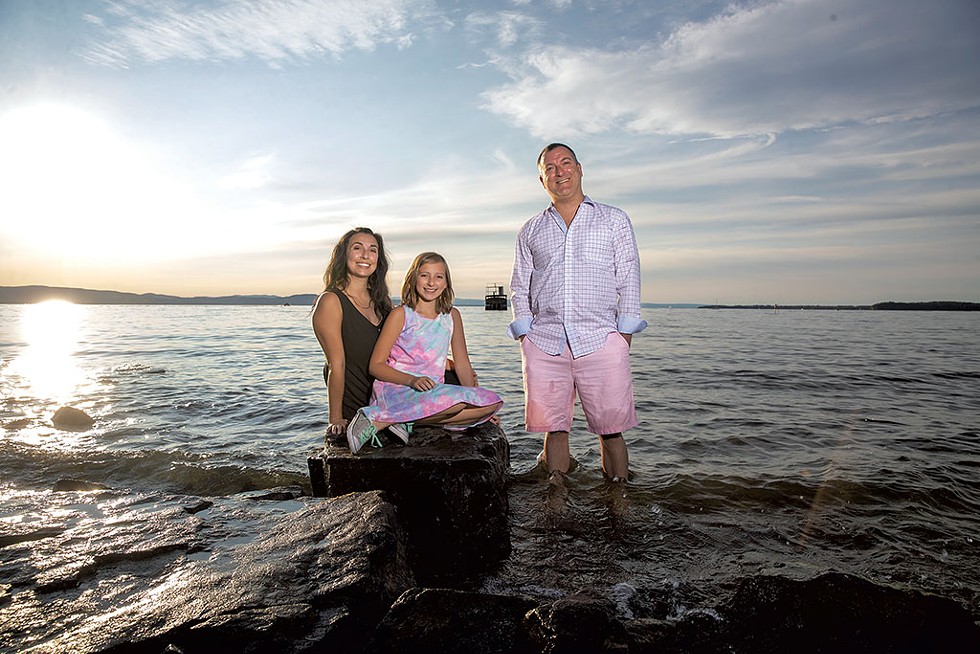
- James Buck
- From left: Alexis Hildebrand, Lydia Perrigo and Alan Reichard during the move to Vermont
Vermont has always appealed to certain kinds of escapists — the homesteaders, the reclusive artists, the doomsday preppers, the celebrities who don't want to be photographed while buying half-and-half. Still, for several decades, Vermont's demographic trends have told a fairly consistent story: Economic prospects are bleh, young people are leaving, and everybody is getting older. Vermont's population last grew substantially between 1960 and 1980, the heyday of the back-to-the-land movement that drew young city dwellers to the woods in search of meaning and morels.
But now, as the COVID-19 pandemic wears on and Vermont makes national headlines for its containment of the virus, its stock as a refuge has been rising. Realtors across the state say they're selling homes at warp speed, sometimes sight unseen. In the slope-side towns of southern Vermont, school enrollments are spiking. Dating apps are suddenly filled with people who are "visiting the area from [insert name of major metropolitan area] to see if I want to move here in a few months" or "chillin here for the rest of the pandemic, hmu." (Note: actual Tinder bios.)
With few hard statistics to draw from — fill out the 2020 Census, people! — it's too early to measure the influx. But in March, U.S. Postal Service data show, requests to forward mail to Vermont addresses jumped 70 percent from the previous year — a possible consequence of wealthy people decamping from Boston and New York City to shelter in place at their vacation homes in Manchester or Stowe.
Related Stuck in Vermont: For a NYC Couple Considering a Move to Vermont, The Pandemic Sealed the Deal: Episode 621

But as Seven Days' reporting shows, the wave of pandemic newcomers is much more diverse than that set. Disenchanted with the Missouri governor's response to the pandemic, a family left the Show Me state for Burlington last month, seeking safer pastures. A Massachusetts family is using an inheritance to leave a crowded public housing unit and buy a house in Brattleboro. A Brandeis University student got stranded in Vergennes over spring break and became a leader in the city's efforts to fight racism.
If the back-to-the-land boomlet is any indication, people seem to be drawn to Vermont in times of social and political crises; those were also the days of the Vietnam War and the civil rights movement. Each of the stories in this package says something about the state of Vermont, not all of which is flattering. And a lot remains to be seen: How many of these new arrivals will stick around? Will some of the telecommuters eventually join Vermont's workforce? What does this mean for rural communities and a housing market that's already unaffordable for many? Will Vermont embrace a younger, more diverse population?
If 2020 has taught us anything, it's that nothing is certain.
— C.E.
Show Me Public Health Standards
Lydia Perrigo, 12, could easily pass for a native Vermonter. She knows that the proper name for soft-serve ice cream is creemee, and she named her pet hamster Maple. She spends her free time riding on the Burlington bike path and swimming in Lake Champlain.
No one would guess that Lydia and her parents, Alan Reichard, 42, and Alexis Hildebrand, 38, moved to Burlington just a month ago in search of a place safer from COVID-19 than Missouri.
When the pandemic hit the family's hometown of Columbia in early March, the mayor issued a stay-at-home order and closed schools and businesses to slow the spread.
But Missouri had no statewide mandates to wear masks or to physically distance from others. As the number of cases grew — reaching 1,000 in just three weeks — Reichard worried their city's bubble would burst. He feared it would only worsen when 40,000 college students moved back later in the year.
At the end of March, a German friend told Reichard that news media there were depicting Missouri Gov. Mike Parson as the poster child for a failed coronavirus response.
"That's when I turned to my wife and said, 'That's it. We've fought the good fight here, but we've got to get out of Missouri,'" he said.
The family had been planning a move and had even considered relocating to Europe until the pandemic quashed that hope. Reichard, a fifth-grade teacher, figured he could get a job almost anywhere. Hildebrand, who works for a company that sells textbooks to colleges online, had been working remotely for months.
The Green Mountains made the family's list of possible destinations because Reichard had worked at Mount Snow in Dover 15 years ago. He'd visited the Burlington waterfront back then and remembered that Vermonters were a friendly bunch. The irony that his family fled one college town for another is not lost on Reichard, but he thinks the testing protocols at the state's colleges and universities are solid. He appreciates the state mask mandate, too.
The family loaded up a gigantic U-Haul truck on July 31 and set out on the 1,300-mile trip. They donned matching T-shirts featuring the Burney Sisters — Lydia's favorite band — and took loads of silly selfies when they stopped along the way. Twenty-two hours later, they arrived at their Ledgewood condo in the South End.
"Where we ended up is just better than we could have hoped for," Reichard said. "We're right next to the water. Lydia's got bike paths to ride. We've got a park to go hike around in," he added, referring to Red Rocks Park.
The family unpacked and settled into their new home during their two-week quarantine. They used Instacart for grocery delivery and registered for Burlington's Supportive Quarantine Program, which provides new residents and returning students with a care package of face masks, a gift certificate to a local restaurant and a library card.
Now that their 14-day isolation is complete, the family has been exploring their new state. They've hiked Mount Mansfield, walked to the Switchback Brewery and used their gift card at the Skinny Pancake. Lydia has already had her fair share of creemees.
"We'll continue to do as the locals do until we feel like we've become local ourselves," Reichard said.
Meantime, his pronunciation of "Adirondacks" — rhyming with "clocks" — could use some work.
It's a dead giveaway.
— C.L.
'They Don't Want Us Here'
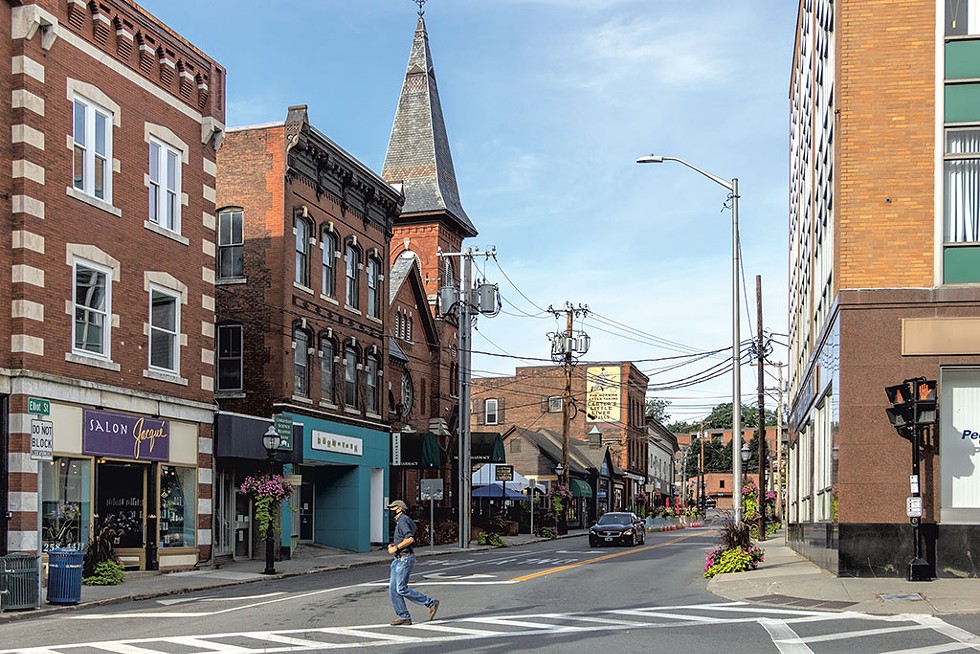
- File: Zack Stephens
- Downtown Brattleboro
Kat was reluctant to admit that escaping the coronavirus is one reason she's moving to Vermont later this month. That's why she wanted Seven Days to use only her first name: She worried that her future neighbors would shun her if they learned she moved from Massachusetts, which has the highest COVID-19 case count in New England.
"You read what locals are saying, and they don't want us here," Kat said. "I wouldn't want to get there and, when things get better, try to establish [myself] and be known for it."
Starting over is what is bringing 27-year-old Kat to Vermont in the first place. She lost her father to cancer in February, just before the pandemic began. In April, a longtime family friend and attorney who offered to help sort out her father's estate contracted COVID-19. Within two weeks, he was dead, and the coronavirus became all the more real. Kat stopped grocery shopping in person and signed up for a delivery service. The family — Kat, her mother, brother and 2-year-old son — agreed to hunker down and abide by Massachusetts Gov. Charlie Baker's stay-at-home order.
Then Kat got sick herself. She was diagnosed with a blood circulation disorder that makes it difficult for her to stand for long periods or to climb the stairs in the family's small public housing apartment.
Kat's health was the tipping point. The family needed to get out.
"There's been too much loss. We kind of wanted a new start, and we wanted somewhere safer," Kat said. "I think the biggest part is, we don't want to lose anyone else."
"After my dad died ... it doesn't feel like there's anything left for us here," she added.
Kat's father left enough money to make a move possible. She started looking at listings in her hometown, Natick, Mass., but the median home value of more than $600,000 priced her out of the market. She broadened her search to other states and virtually toured three homes, including one in Brattleboro that's two hours from both her grandparents' home in Massachusetts and extended family in central Vermont. Even better, it's single-story and near a hospital in case Kat has any health complications. At $191,000, the home was within the family's price range.
When the deal closes on September 11, Kat will be leaving the only place she's ever known for a place she's never been. She's seen photos of the house and read the inspection report but hasn't been there in person. Her mom and brother have found remote jobs, but Kat, who lost her retail job when the pandemic hit, hasn't yet found work. A self-described worrier, Kat is surprising herself with the move.
"If it wasn't for those few things happening all together at once, [I don't think] that I would be doing this," she said. "It's a leap of faith. That's really what it is."
Moving during a pandemic creates its own type of worry. Vermont's case counts look manageable now, but that could change — and Kat worries that natives could blame newcomers. Posts in a Brattleboro community Facebook group seem to confirm her fears.
"I live in a town of less [than] 900 people and we aren't very happy about outsiders coming here believe me," one woman wrote. Another posted, "In a very small area, it can be scary, considering this virus can kill." Still others complained that out-of-staters are buying up all the housing stock and driving up home prices.
Having read those comments, Kat can't help but feel like she's intruding. She says she'd feel the same if the roles were reversed. But at the same time, after losing her father and friend, Kat said her family will be more careful than most to keep their physical distance.
She said, "We don't want to hurt anyone."
— C.L.
Climate, Then COVID-19, Steered Arizona Couple to Underhill

- Courtesy
- Nina Iarkova and Shane Unger
For three years, Shane Unger and Nina Iarkova have lived in Peoria, Ariz., a tony suburb with every conceivable big-box store, about 20 miles northwest of downtown Phoenix. Peoria's main attractions are Lake Pleasant, a 10,000-acre man-made reservoir, and the Peoria Sports Complex, the spring training facility of the San Diego Padres and the Seattle Mariners. The kitchen window of Unger and Iarkova's apartment offers sweeping views of its parking lot.
Long before the pandemic, the couple dreamed of moving to Vermont. They had vacationed in the Green Mountain State — they're particularly fond of the craft brewery scene — and found an ethos that resonated with them. "We're both very environmentally conscious, and we really appreciate Vermont's environmental laws, especially the composting law," said Unger, 37, who works in information security for a financial company. "We try to never throw away food scraps, but it's difficult, as apartment dwellers."
Twenty-eight-year-old Iarkova, a web developer for a payroll software firm, has lived in the Phoenix area since she was 12. "We're ready to be around like-minded people," she said, referring to the lack of ecological awareness that she observes in Phoenix.
For the past four years, Phoenix has attracted more new residents than any other city in the country. This population boom has contributed to some of the worst air pollution in any U.S. metropolis. August was Phoenix's hottest month on record, with an average high temperature of 110.7 degrees. Climate scientists have warned that the city could face a water crisis within the decade; recently, Unger said, he read an article in a Phoenix paper about a new housing complex whose developers couldn't guarantee that buyers would have access to water for their homes for the next 100 years. "This just isn't a sustainable place for anyone," Unger said.
As the world continues to warm and ecological disasters become more intense and frequent, Vermont, with its relatively cool weather and abundant water supply, seems poised to become a destination for climate migrants.
Elena Mihaly, an attorney with the Conservation Law Foundation, and Kate McCarthy, director of the Sustainable Communities Program at the Vermont Natural Resources Council, have spent the past few years analyzing climate migration trends. In the summer 2020 issue of the quarterly Vermont Environmental Report, Mihaly pointed to the influx of new residents during the pandemic as a harbinger of what's to come. "The rate of homes being bought online by out of staters is a good indication of how eager people are to access land in Vermont and benefit from the state's natural resources and open space," she noted.
In a sense, Unger and Iarkova are climate migrants for whom COVID-19 was a catalyst. In March, when their jobs went remote, they started looking for properties in Vermont. They wanted privacy but not total seclusion, proximity to Burlington International Airport, enough land for a garden, and an in-law apartment for Unger's mother, who decided to move with them from Santa Monica, Calif.
A family friend of Unger's connected the couple with David Parsons, a real estate agent in Chittenden County, who gave them virtual tours of about half a dozen houses in the Burlington area. All of the homes were snapped up by other buyers, sometimes just hours after Unger and Iarkova had seen them. (At one point, they made an offer on a house in Shelburne above asking price; two days later, the property went to someone whose bid was even higher.)
At last, in late June, they found a four-bedroom house on 11 acres in Underhill with a finished in-law suite in the basement. For $639,900, it became theirs; their move-in date, said Iarkova, will be sometime in mid-September.
"We're really excited," said Unger. "We talk constantly about our plans for the house, what we'd like to do with the land." The previous owners cut more than a mile of hiking and mountain biking paths through the woods surrounding the property, and Unger and Iarkova joke about painting a map and naming each section of the trail — "you know, 'Nina's Gulch,' or 'Shane's Crossing,'" said Unger. But their excitement, he added, is tinged with guilt: "A lot of people are getting evicted, losing their homes, and we're fortunate enough to buy a home. Our reality isn't other people's realities."
They're also hyper-aware of the stigma that may come with being part of a pandemic-induced urban exodus, and they want their community to know that they plan to stay for the long haul.
"We're conscious of the fact that we're going to be seen as outsiders for a little while," said Unger. "That's a challenge that we're going to have to overcome."
— C.E.
An Epidemiologist's Sanctum
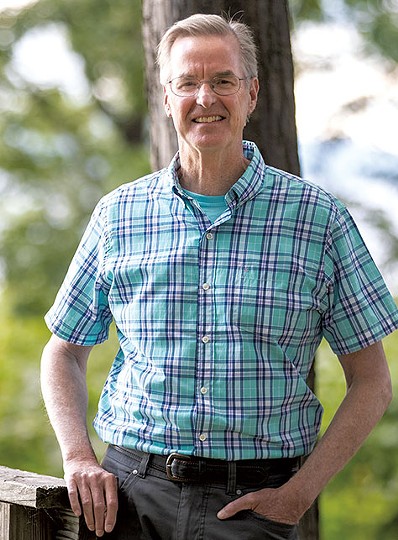
- James Buck
- Jon Andrus
Jon Andrus begins each day with a morning meditation. For 10 minutes before his coffee and shower, he sits in bed and gazes out the window at Lake Champlain. He thinks of his family. Though he hasn't seen them for weeks, they still connect on the phone and online. He silently appreciates that he has a safe place to ride out the coronavirus.
And then he gets to work.
Andrus is a part-time college professor and epidemiologist with more than three decades of experience in public health. He teaches global vaccinology, a topic that could not be more relevant as nations race to develop a COVID-19 vaccine.
Andrus came to Vermont in March to celebrate his 67th birthday, and he hasn't left. He and his wife, Susan, had just returned to their Burlington condo after a ski trip at Trapp Family Lodge when they learned that coronavirus cases were climbing across the country. Andrus has an underlying heart condition and was wary of flying home to Washington, D.C.
"We had this serious discussion: 'Should I go back? Should I fly back with you, or should I stay?'" he recalled. "It was clear that things were starting to take off very rapidly."
Andrus' employer, George Washington University, shut down in-person classes and allowed him to teach remotely. A two-week intensive course that Andrus normally teaches in person at the University of Colorado each fall will also be conducted virtually. His wife, however, had to return to her job as a real estate agent in Washington. Business has been booming during the pandemic.
Andrus has kept busy. He records two-hour lectures for his students to listen to before their class convenes on Zoom, when he leads a two-hour discussion on global health. Nearly every session is focused on the coronavirus, so Andrus spends his prep time monitoring vaccine trials.
He's also done numerous spots in the national media, often dissecting President Donald Trump's pandemic response. He told Newsweek, for instance, that the administration should have mandated masks and stricter social-distancing protocols early on.
"We're having 1,000 deaths a day in the United States. That's inexcusable," Andrus said in an interview with Seven Days, noting that the U.S. hasn't learned from countries such as Canada, which is faring relatively well during the pandemic.
"That's very unfortunate and breaks all the guiding principles of good public health practice," he said.
Andrus would know: He worked for the federal Centers for Disease Control and Prevention for 22 years and was part of a team that eradicated polio in the Americas in 1991. He also served as chief of the Pan American Health Organization's immunization unit, where he focused on measles and rubella, and he later became that organization's deputy director.
Today, Andrus serves on several advisory groups for the World Health Organization. Trump announced in May that he intends to pull the U.S. out of WHO, a decision that experts warn could lead to a resurgence in the very diseases that people like Andrus worked to eliminate.
Global health "is not going to fare well unless we course-correct very soon," Andrus said. "The epidemiology of transmission of these diseases — you can't politicize that. It requires a public health response, and they are not doing that."
By contrast, Andrus thinks Vermont has handled the pandemic well. He lauded the state's use of contact tracers and insistence on physical distancing as practical and science-based approaches to stemming the spread.
Seven Days asked him whether Gov. Phil Scott should have mandated masks sooner. Perhaps, Andrus said, but he noted that even Dr. Anthony Fauci, the country's top infectious disease expert, questioned the efficacy of wearing masks at the pandemic's start. Pop-up testing sites are effective, too, Andrus said, recounting how he stopped by Burlington's J.J. Flynn Elementary School a few weeks ago for a nose swab.
It came back negative — not surprising, since Andrus has mostly been alone for six months.
Andrus fell in love with Vermont when he and Susan took a bicycle tour in 2008. Seven years later, they bought their condo in the New North End, just steps from the bike path. Now, Andrus doesn't think he'll ever return to Washington, save for grabbing some books and photo albums he left behind.
"I see myself, more and more, retiring here," Andrus said. "The COVID stay has been a blessing in disguise."
When he's not at the virtual podium, Andrus has been exploring the state by foot, bicycle and foldable kayak. He's made his first trips to Lake Willoughby, Mount Pisgah and the Marshfield Dam Reservoir. He's started painting again and has taken up yoga.
After years of putting the world's health first, Andrus is finally looking inward.
"There are days when I feel very depressed and sorry for myself," he said. "But at the end of the day, if I was to be isolated and alone any place, this is a nice place to be."
— C.L.
She Could Help Vergennes — If She Could Afford to Stay
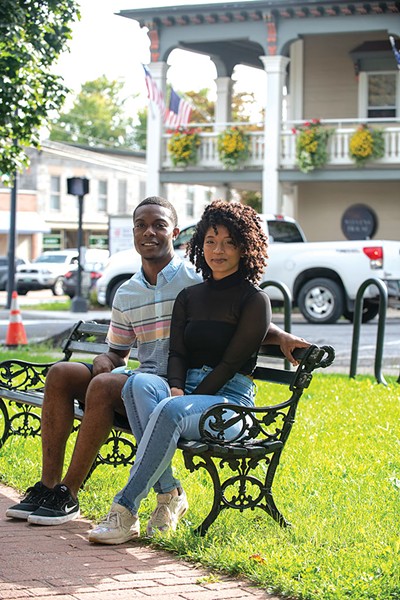
- Caleb Kenna
- Jamel Miller and Rose Archer
In early March, 21-year-old Brandeis University senior Rose Archer left campus to spend spring break with her boyfriend, who had just moved to Vergennes to start a job at Kria Botanicals in South Burlington. Then the pandemic struck, and Brandeis canceled in-person classes, leaving her stranded in Vergennes with nothing but a duffel bag.
Archer, who grew up in Brooklyn, N.Y., and Newark, N.J., had some trepidation about being stuck in small-town Vermont. Both she and her partner, Jamel Miller, are Black; at times, she struggled with being one of very few Black people in the community, particularly after George Floyd's killing in May by Minneapolis police sparked nationwide protests. Archer wanted to get involved in the fight against racism, but she feared that any activism would make her even more visible in a place where she already felt uncomfortably conspicuous.
"I had no idea if anyone would stand by me," she said. "Every time I walk out my door, people do a double take. There are so few people here who look like me. I was worried about making myself a target."
Archer and Miller live in a studio apartment above Shear Cuts on Main Street with a view of the city green from their kitchen windows. One day, in June, Archer looked outside and saw 50 or so people gathered in the park, frozen in varying postures of deep introspection. ("Honestly, it looked culty AF," she said.) Later, she learned that the gathering was a silent vigil in honor of Floyd organized by Lizbeth Ryan, the director of a nonprofit resale shop in downtown Vergennes.
"It was astonishing to me to see that so many people cared," said Archer.
Not long after the vigil, Archer spotted a high-school-age girl standing alone on the northwest corner of the green one morning, holding a Black Lives Matter sign. An older white man began harassing her — "saying, you know, 'All lives matter, you're being racist, blah blah blah,'" Archer recalled. After the man had walked away, Archer went down to the corner with her own Black Lives Matter sign and stood with her. Ryan, who happened to be at her shop across the street, saw Archer and came out to ask if she'd be willing to speak at a future vigil.
At first, Archer was hesitant — the perils of speaking out against anything in a small town, especially one whose population is 98 percent white, weren't lost on her — but, ultimately, she agreed. "These are people who really, really care, who are asking for guidance in how to address systemic racism within their own community," she said. "I don't have the answers, but I do know the right questions. I'm always going to be Black, and I don't have to speak about it, but I also have a voice and the chance to make it heard."
A few weeks later, nearly 150 people listened as Archer sang "Lift Every Voice and Sing," often referred to as the Black national anthem, at an event on the city green. Soon after, she began leading anti-racism workshops, which consistently drew 40 to 60 participants.
For the past couple of months, Vergennes has been mired in a political imbroglio around race and policing. The former mayor, Jeff Fritz, who had advocated for a police oversight board, announced his resignation during a public council session, in July, over a series of texts he'd exchanged with the city manager. Three aldermen quickly followed suit. The city council is no longer functional, and a special election has been called for later this month.
Archer watched all of this unfold with bafflement. She was supposed to speak before the council on the issue of racial equity the week after Fritz's resignation, but the aldermen's resignations prevented a quorum, and the meeting was canceled.
In spite of this dustup, Archer has begun to feel that she's found a home in Vergennes — a place where she can make a difference on an individual scale, where she knows she could help change the social infrastructure that has maintained the white status quo. Since plans for the oversight committee have been stalled in the absence of a functioning government, Archer has helped design a mission statement and a website for Vergennes Forward, a citizen group focused on government accountability and equity and inclusion in the community.
Danforth Pewter and a teacher at Vergennes Union High School have requested her anti-racism workshop; as a matter of principle, Archer requests donations instead of charging a fee, because she doesn't want cost to be a barrier. Several people, she said, have suggested that she run for mayor.
In other words, she has no shortage of work, but she can't find a job that pays enough to afford the cost of living in Vergennes. Her plans to work in the Flynn's teaching artist program were scuttled by COVID-19; her partner, who was laid off this spring, has been scraping by on unemployment. Neither of them sees a financially sustainable future in Vermont.
"Finding a job here is damn near impossible," she said. Resources and support systems for people of color don't exist in Vergennes, she noted. "It's not that Vermont is a bad place, but there's just no community for us out here," she said. "Hair is a big deal. There's no salon here where people know how to cut Black hair. And that's just one small thing."
Miller and Archer will move out of their apartment at the end of September — Archer will return to her family's place in Newark, and Miller will go back home to Long Island. But Archer isn't ready to leave Vergennes behind. She plans to continue holding her anti-racism workshops for Vergennes residents and Vermont businesses via Zoom. "I want to make a mark here," she said, "and to show other people of color that they can make a mark here, too."
— C.E.
Her Little-Town Blues Are Melting Away
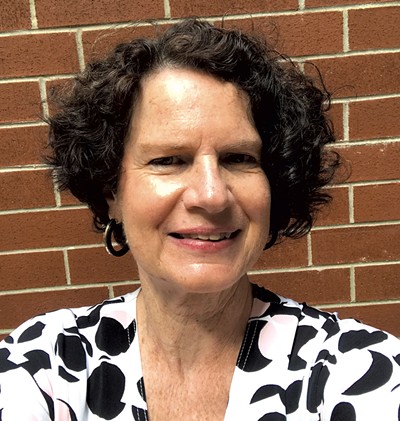
- Courtesy
- Maureen Cross
When the coronavirus pandemic quieted New York City in March, Maureen Cross quickly made up her mind: She'd move to Vermont, where she had attended college and spent more than two decades of her adult life.
"It was like, well, if I'm here and nothing I like to do is available — I go to the museums all the time, and the theater — what am I doing here?" Cross said. "And I thought, I'll go back to Burlington! I'll go hiking all the time, and I'll get something for the same amount of money, and I'll get a three-bedroom and have my own office and a driveway and a huge kitchen and a washing machine and a dishwasher."
So, on June 1, Cross traded her rent-stabilized studio on Manhattan's Upper West Side for an apartment in Burlington's Old North End. The 64-year-old is single and worked remotely as a certified public accountant even pre-COVID-19, making the move fairly seamless. Her new Park Street place had all the amenities she desired, and she could easily stroll to Lake Champlain with her two Siberian huskies.
But the honeymoon didn't last.
Cross says she felt unsafe venturing out in the Old North End after 10 p.m., a marked difference from her comfort on the streets of New York. She experienced some friction with neighbors who shared her driveway. And she missed the diversity of people, cultures and food she'd left behind.
Cross also felt like dogs were unwelcome in Burlington's green spaces. She said she got yelled at for letting them off-leash.
"I've never seen so many 'no dog' signs in my life," Cross complained.
The experience was a far cry from her years at Burlington's now-closed Trinity College in the 1970s, she said. After graduation, she spent a decade in Boston before returning to the Burlington area for 18 years. She moved to New York City in 2006 and has been there ever since, but for a five-year stint in San Francisco.
She had thought her familiarity with Vermont, and the friends and family she has in the area, would make the transition easier.
"I just didn't end up seeing them. It just felt like it was a weird time to come back," Cross said. "I'd invite people over, and they just seemed afraid. I don't know if it was because I was from New York City or — I don't know. I didn't connect with people in the way that I did when I lived there before."
She'd have liked to cross the international border to visit the nearest metropolis, Montréal, but it remained closed.
Cross visited New York City just three weeks after leaving and realized she missed it. She began looking for an apartment there and set a goal for herself: to return in time for the late-August reopening of the Metropolitan Museum of Art, where she's a member and visits frequently.
The moving company she used was shocked when Cross called them again to pack her up and bring the stuff back to Gotham. By August 23, she was headed south.
"When I drove down the Hudson River Parkway, just seeing all the people on the bike path, I just felt like I hadn't seen people in so long," Cross said. "I was just happy, and happy to just get back into my regular routine."
Once home, Cross recounted her misadventure to the West Side Rag, an online news outlet. The story went viral, an antidote for resolute urbanites to the tales of those who had happily left them behind.
Also eye-catching: Cross' description of Lake Champlain and the Green Mountains as "a little sterile, like a postcard."
She laughed when asked about that description during a phone interview with Seven Days.
"Here, it feels more interactive," Cross said. "I look at the Hudson, I look over at New Jersey, I go to Randall's Island — it just feels more alive. Maybe there was a better way to phrase it.
"It's like a visceral thing," she continued. "When I lived in San Francisco, I'd look at the Golden Gate Bridge and go, 'Whatever.' It didn't have any effect on me. I look at the Bow Bridge in Central Park and go, 'Ohhhhh,' or the brownstones — I missed the architecture."
In Burlington, "there was only so much variety of places I could walk to. It just stopped affecting me. Whereas here, I never stop thinking that it's so pretty."
Her story was picked up by the UK's Daily Mail website last week, and Cross has since given interviews to local Fox and NBC affiliates, plus "Inside Edition." She joked that she and comedian Jerry Seinfeld, who recently wrote a New York Times op-ed about the resiliency of the city in the face of the pandemic, will team up to deliver a simple message: "See? New York does not die."
"Then," Cross said, "for the mayor and the governor, I'm going to create a campaign that says, 'I left New York, and now I know it's irreplaceable. I'm home again.'"
— S.G.
Distance Learning
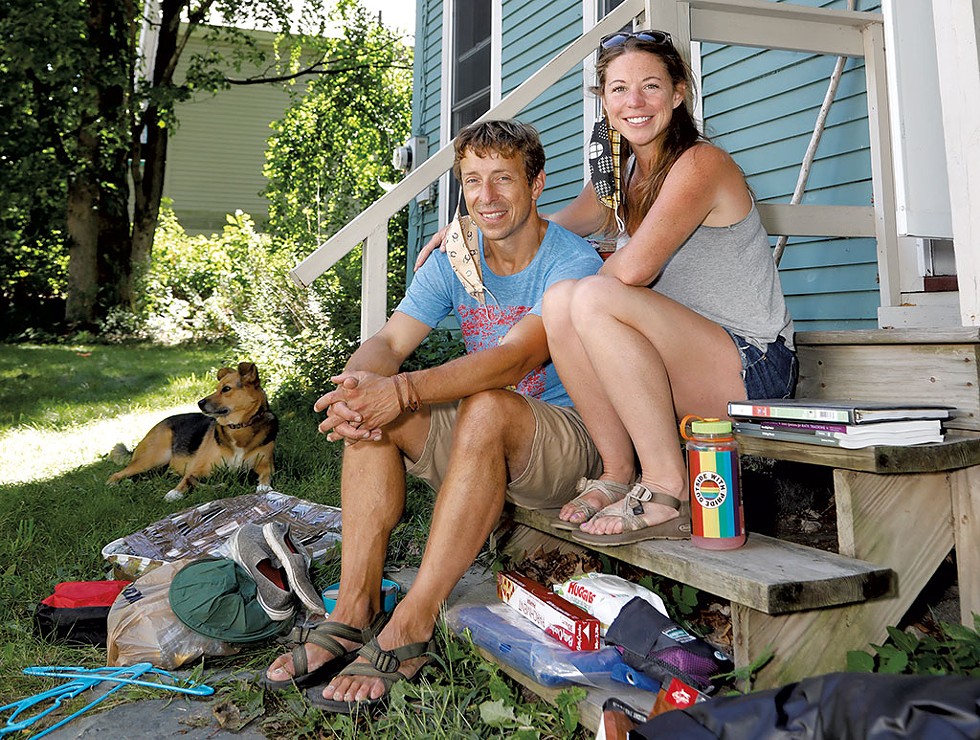
- David Shaw
- Brandon Conrad and Donna Lloyd with their dog, Hesse
Brandon Conrad and Donna Lloyd are used to a nomadic lifestyle. The couple met while teaching in Seoul, South Korea, in 2010, and in the last decade they've also taught in Albania and Oregon. They lived most recently in British Columbia but after years of globe-trotting decided they were ready to settle down closer to family.
The teachers homed in on Vermont, whose mountains and lakes seemed the perfect fit for the adventurous pair. The state is just a day's car ride to Lloyd's mother in Ontario and a quick flight to Conrad's family in Florida. They submitted job applications and landed several interviews before taking off on a trip to Ontario to await the news.
Lloyd's mom wasn't thrilled to hear that her 38-year-old daughter was considering a move to the United States during a deadly pandemic. The country is home to 4 percent of the world's population but a staggering 25 percent of all COVID-19 cases. Why would they want to leave Canada? her mother wondered. Didn't they watch the news?
So every day, Conrad, who is 43, turned his morning coffee date with his mother-in-law into a sales pitch. He trotted out charts and graphs showing that Vermont's case counts were much lower than the rest of the country's, and Ontario's, too. Vermont is no Texas or New York City, Conrad told her.
The matriarch was soon convinced that Lloyd wouldn't be marching to her death by crossing the border. She came around just in time: Conrad got a job on August 3, and the couple laid plans to move to Brattleboro. They had a bit more than a month to relocate across the continent and hadn't started packing.
"When we gave her a hug and said bye ... it was knowing that we're going to go to a place that's taking care of business, that isn't inundated with people that are anti-maskers or people that are reckless in their behavior," Conrad said.
"We kind of realized, Are we ever going to have this opportunity again?" he added.
Lloyd and Conrad caught a plane back to British Columbia, stuffed their belongings into their Subaru Legacy wagon and set off. They camped along the way, choosing remote spots to self-isolate, and half expected agents to take their temperature at the border. (They didn't.) They crossed without difficulty — Conrad is a U.S. citizen, and Lloyd holds a green card.
The couple arrived in Vermont in mid-August, a few weeks before their lease began. They decided to quarantine at an Airbnb campsite in Strafford, a tiny Orange County town. Their host fed them fresh produce and homemade soup. It tasted like manna after the PopCorners, crackers and other nonperishables they'd subsisted on during their road trip.
Lloyd and Conrad finally settled into their apartment on Saturday, three days before school started. Conrad is teaching high schoolers at the Windham Regional Career Center in Brattleboro, while Lloyd is telecommuting to Newport to teach kindergartners at the opposite end of the state. She's one of four K-4 teachers who is working remotely for the district this year, she said.
Lloyd's mom — perhaps in a last-ditch ploy to stall her daughter's move — had warned that teaching from home would be boring. "Won't you miss having real conversations with your colleagues and students?" her mother had asked.
Lloyd had scoffed at the question but now sees how isolating it can be to move during a pandemic. She wanted to join a book club but realized none are convening in person. Conrad looked forward to dining out with new friends but soon recognized that Vermont's warm days, which allow for safe socializing outside, are quickly passing by.
"It's just going to be different," Lloyd conceded. But, she added, "We're positive we're gonna like it here."
— C.L.
Correction, September 9, 2020: A previous version of this story misstated the amount of the increase in requests to forward mail to Vermont addresses.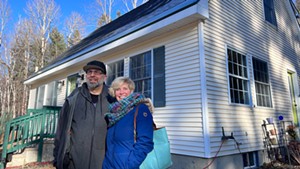

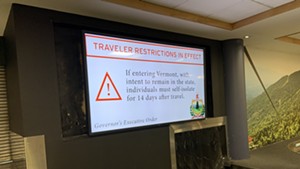









Comments
Comments are closed.
From 2014-2020, Seven Days allowed readers to comment on all stories posted on our website. While we've appreciated the suggestions and insights, right now Seven Days is prioritizing our core mission — producing high-quality, responsible local journalism — over moderating online debates between readers.
To criticize, correct or praise our reporting, please send us a letter to the editor or send us a tip. We’ll check it out and report the results.
Online comments may return when we have better tech tools for managing them. Thanks for reading.